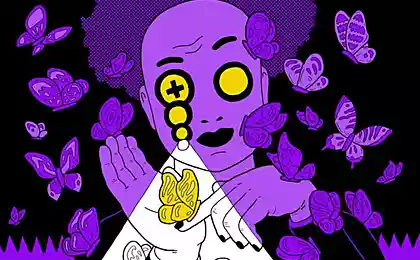464
Want understanding? Risk going to conflict!
Everyone wants to be understood: understand the spouse knew the kids, knew the parents, knew colleagues, superiors, subordinates, the doctor in the clinic, the controller in the bus, the clerk at the store and all the others that are not included in this list — no matter how often or seldom we meet with them.
It is difficult to explain what should do the other, to understand us, but it is easy to describe this extremely pleasant feeling — "understand me".

At this point, everyone feels that got what he always wanted: the right to be as you are and feel what you feel.
"I understand why you're mad at me", "I understand why you resent me", "I understand why I ruined your mood", "I understand why you're scared of me"...
I wonder how many of you have heard such words at home or at work? Even more interesting, how often have you said them to someone? Curiously, out, what all want to hear, few people willing to say!
Imagine you say to someone, "I understand why you're mad at me". I'm sure most or stopped breathing from fear, or already have a full chest of air, to Express their outrage.
Angry in response to feelings and reactions of another is the most common method of communication.
It is easiest to say: "why are you angry? Don't be mad", "Why are you offended? There is nothing to be offended". And then — the most common phrase: "You are to blame!", followed by list of offenses, including those that did not.
Then: "But if you did..." Completes the chain, "But I would in your place..."
A strange form of dialogue — often it looks more like a monologue — usually interrupted by a weak or inadequate aggressive attempts to defend the one who dared to take a step first and tell about their feelings.
Take a chance to speak about their feelings, to Express their dissatisfaction is not a way to aggravate the situation, it is an attempt to make the first move from latent conflict and tension to improve relations.
Think it's hard? Not at all! You just have to start with yourself, to accept that he could be wrong: like the best, but it turned out as always. The other is our child, spouse, colleague, subordinate — is not a full copy, thinks differently, feels differently, and wants different. And to understand it, we must go through many conflicts, quarrels and reconciliations, which are the only way to improve human relationships.

To do this, just try after someone else's: "I'm angry, offended, scared of you," to venture to ask: "Why?.." ...and wait for a response!
Author: Elvira Khmelnytsky
P. S. And remember, just changing your mind — together we change the world! ©
Source: elv.by/xotite-vzaimoponimaniya-risknite-pojti-na-konflikt/
It is difficult to explain what should do the other, to understand us, but it is easy to describe this extremely pleasant feeling — "understand me".

At this point, everyone feels that got what he always wanted: the right to be as you are and feel what you feel.
"I understand why you're mad at me", "I understand why you resent me", "I understand why I ruined your mood", "I understand why you're scared of me"...
I wonder how many of you have heard such words at home or at work? Even more interesting, how often have you said them to someone? Curiously, out, what all want to hear, few people willing to say!
Imagine you say to someone, "I understand why you're mad at me". I'm sure most or stopped breathing from fear, or already have a full chest of air, to Express their outrage.
Angry in response to feelings and reactions of another is the most common method of communication.
It is easiest to say: "why are you angry? Don't be mad", "Why are you offended? There is nothing to be offended". And then — the most common phrase: "You are to blame!", followed by list of offenses, including those that did not.
Then: "But if you did..." Completes the chain, "But I would in your place..."
A strange form of dialogue — often it looks more like a monologue — usually interrupted by a weak or inadequate aggressive attempts to defend the one who dared to take a step first and tell about their feelings.
Take a chance to speak about their feelings, to Express their dissatisfaction is not a way to aggravate the situation, it is an attempt to make the first move from latent conflict and tension to improve relations.
Think it's hard? Not at all! You just have to start with yourself, to accept that he could be wrong: like the best, but it turned out as always. The other is our child, spouse, colleague, subordinate — is not a full copy, thinks differently, feels differently, and wants different. And to understand it, we must go through many conflicts, quarrels and reconciliations, which are the only way to improve human relationships.

To do this, just try after someone else's: "I'm angry, offended, scared of you," to venture to ask: "Why?.." ...and wait for a response!
Author: Elvira Khmelnytsky
P. S. And remember, just changing your mind — together we change the world! ©
Source: elv.by/xotite-vzaimoponimaniya-risknite-pojti-na-konflikt/
The prayer of a man of advanced age
Quiz: are your ideas about the differences between boys and girls true























